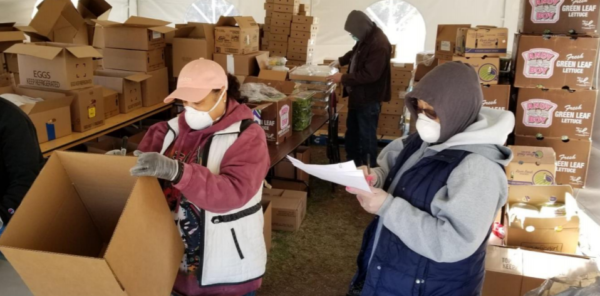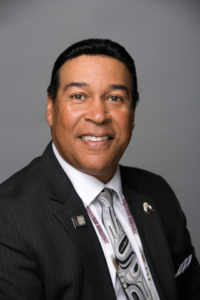
- Details
- By Levi Rickert
SHINNECOCK NATION — The data emerging from the COVID-19 deaths reveals that a disproportionate number of people of color are being impacted by the pandemic.
On Monday, the New York assembly and senate held a Zoom legislative hearing to gather testimony on the impacted communities.
 Shinnecock Indian Nation Vice President Lance Gumbs
Shinnecock Indian Nation Vice President Lance Gumbs
Shinnecock Nation Vice President Lance Gumbs was called to speak about the effect of COVID-19 on his tribe, located 90 miles from Manhattan on Long Island. Shinnecock Nation was the only tribe among the eight federally recognized tribes in New York represented during the hearing.
Gumbs, who also serves as the northeastern regional alternative vice president of the National Congress of American Indians, used the opportunity to tell the lawmakers about how severe the COVID-19 has hit the Navajo Nation and the pueblos in New Mexico that face the possibility of extinction.
“At Shinnecock, we have avoided that result only through stringent measures we put in place to protect our people. We cannot survive any curve, we must exclude it entirely,” Gumbs testified.
Since the outbreak of the COVID-19 pandemic, the Shinnecock Nation has had seven confirmed cases and three deaths related to COVID-19.
“Like other minority communities, tribal communities are more likely to suffer pre-existing health conditions...than the general population. Native communities already suffer catastrophic levels of diabetes, cardiovascular disease and obesity – conditions that increase risk of death even before the increased susceptibility of COVID-19 complications,” Gumbs told the lawmakers.
Gumbs says inadequate health care and lack of access to primary care contribute to the suffering among his tribal citizens. He said increased preventable health and wellness programs would be part of the solution to eliminate the problem.
The Shinnecock Nation serves as a gateway to the Hamptons on Long Island, where many people from Manhattan left the city to find refuge in their summer properties as the pandemic hit. The result was a rush for food in March and April from local Long Island grocery stores that had not stocked up for high traffic so early in the year.
To compound the food shortage caused by the sudden influx of city dwellers, 60 percent of the Shinnecock citizenry live below the poverty level according to census data. In response, the tribe set up a food tent to feed its tribal citizens.
“For 10 weeks, we have been operating the Shinnecock Food Distribution Tent to ensure adequate food to unemployed citizens and also to encourage all people to stay within the Territory. But we have depended on outside donations, increasingly difficult as outside communities came to rely on the same food sources,” Gumbs testified.
An additional problem Gumbs addressed in his testimony is the lack of adequate housing in the Shinnecock community.
“We have limited homesites on the reservation, and families are crowded together, or forced to seek housing elsewhere. In the current crisis, meaningful quarantine and isolation is almost impossible – meaning that a single positive case threatens many people,” Gumbs told lawmakers.
He concluded his testimony by addressing the lack of technology on the Shinnecock’s tribal lands. Many of the Shinnecock lack access to Internet service, a problem that is prevalent throughout many parts of Indian Country.
While he was the only American Indian to address the lawmakers, Gumbs told Native News Online he appreciated the opportunity to represent tribal nations during the critical times of the COVID-19 pandemic.
More Stories Like This
Native News Weekly (August 25, 2024): D.C. BriefsUS Presidents in Their Own Words Concerning American Indians
This Day in History — Dec. 29, 1890: Hundreds of Lakota Killed During the Wounded Knee Massacre
Monday Morning (December 29, 2025): Articles You May Have Missed This Past Weekend
Native News Weekly (December 28, 2025): D.C. Briefs
Help us defend tribal sovereignty.
At Native News Online, our mission is rooted in telling the stories that strengthen sovereignty and uplift Indigenous voices — not just at year’s end, but every single day.
Because of your generosity last year, we were able to keep our reporters on the ground in tribal communities, at national gatherings and in the halls of Congress — covering the issues that matter most to Indian Country: sovereignty, culture, education, health and economic opportunity.
That support sustained us through a tough year in 2025. Now, as we look to the year ahead, we need your help right now to ensure warrior journalism remains strong — reporting that defends tribal sovereignty, amplifies Native truth, and holds power accountable.
 The stakes couldn't be higher. Your support keeps Native voices heard, Native stories told and Native sovereignty defended.
The stakes couldn't be higher. Your support keeps Native voices heard, Native stories told and Native sovereignty defended.
Stand with Warrior Journalism today.
Levi Rickert (Potawatomi), Editor & Publisher

